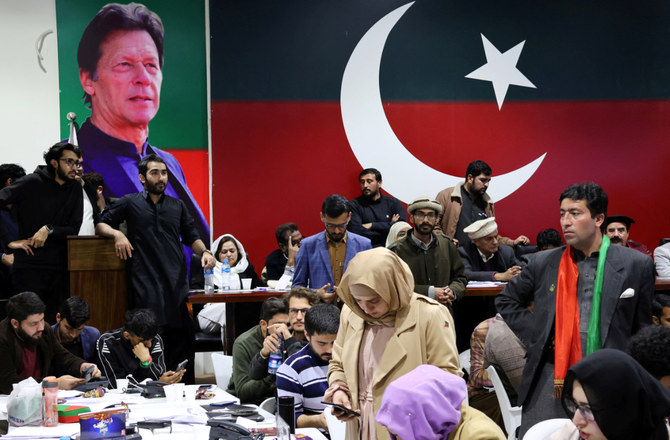
Free and Fair Election Network (FAFEN) urged Pakistan’s Election Commission to conduct inquiry into allegations of rigging leveled by different political parties
Gahler raised the alarm about pre-election practices highlighting restrictions on the media, an uneven playing field for candidates, and a systematic effort to undermine the former ruling party
ISLAMABAD: “On election day, voting was assessed as well-conducted and transparent,” said Michael Gahler, chief observer of the EU Election Observation Mission (EUEOM), at a press conference in Islamabad on Friday.
However, Gahler raised the alarm about pre-election practices highlighting restrictions on the media, an uneven playing field for candidates, and a systematic effort to undermine the former ruling party.
“Although there were several legal provisions aimed at ensuring a level playing field, we have concluded that there was a lack of equality of opportunity,” he said.
Gahler said that numerous interlocutors acknowledged a systematic effort to “undermine the former ruling party through cases of corruption, contempt of court and terrorist charges against its leaders and candidates.”
“Media outlets and journalists suffered from restrictions, which resulted in extraordinary self-censorship,” he said. “This resulted in election coverage without impartial scrutiny.”
Both local and international election observers have expressed satisfaction with polling day arrangements.
Gahler said that while results were still pouring in from several constituencies, this would not damage the electoral process. He added that the international observers were not interested in the results but rather the electoral process.
The EUEOM deployed 120 observers on polling day across Pakistan — except Balochistan province due to security reasons. They visited 113 different constituencies, 582 polling stations and tabulation centers to observe the electoral process.
In the elections held on July 25, the party of former cricket star Imran Khan won a majority of seats to form a federal government. His opponents have, however, alleged massive rigging in the polls and rejected the results.
The preliminary statement released by the EUEOM said that a total of 11,855 candidates contested the elections, of which 55 percent stood as independents. “Some 4.8 percent of candidates were women,” it said.
The report pointed out that the legal requirement to nominate at least 5 percent of female candidates was not met by 7.4 percent of parties contesting the elections.
The July 25 polls mark the second consecutive democratic transition of power, addressing uncertainties over the future of democracy in Pakistan. According to the Election Commission of Pakistan, voter turnout in the election was 55.8 percent. A total of 105.96 million registered voters used their right to franchise on the polling day.
Earlier in the day, the Free and Fair Election Network (FAFEN) — a non-government organization based in Islamabad — also presented its election observation report and acknowledged “significant improvement” in the quality of electoral process.
The FAFEN has urged the ECP to conduct an inquiry into the allegations of rigging leveled by some major political parties including the Pakistan Peoples Party and the Pakistan Muslim League-Nawaz. “Otherwise, the country may spiral into a phase of political and public protest and outcry that inhibits political stability,” it said.
The deployment of as many as 371,000 armed forces personnel on election duties, despite questions from some political parties, “ensured the peaceful conduct of election day amid heightened threats of subversive acts,” the report said.
It, however, pointed out that “some aspects of the pre-election environment and the vote-counting process present cause for concern that should be addressed.”
The FAFEN deployed a total of 19,683 trained, non-partisan observers to monitor the voting and counting process at 72,089 polling stations in 270 National Assembly constituencies, it said.
“The voting process on election day generally remained smooth,” the report concluded.











